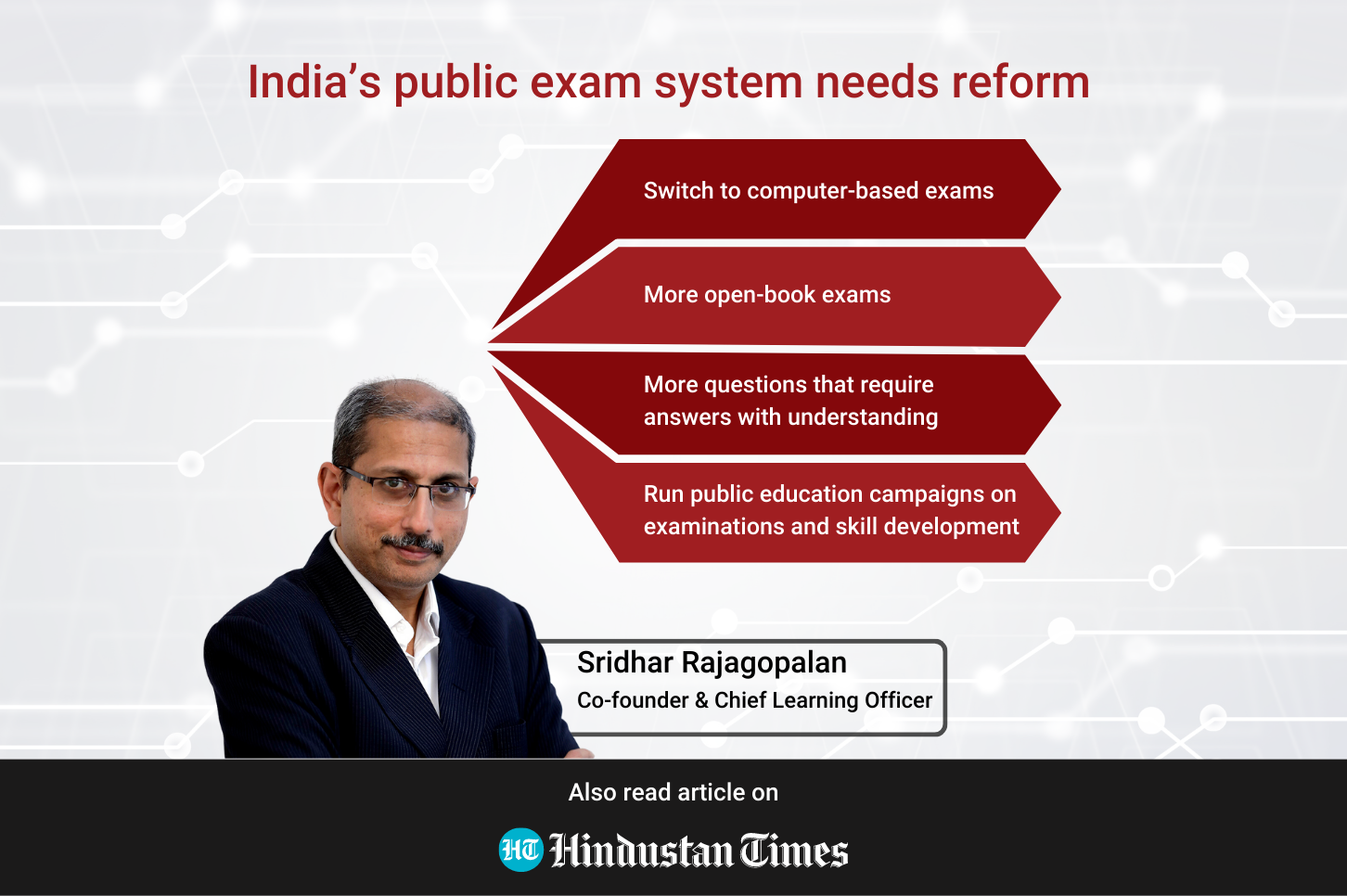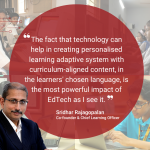- March 27, 2023
- by Sridhar Rajagopalan, Co-founder & Chief Learning Officer, Ei
- Blog, Category, Newest
- 0 Comments
Every exam season brings a torrent of news of exam glitches, paper leaks and promises of strict action to prevent such occurrences in the future. Yet, even by those standards, the past few months have been blighted by a string of controversies. Last month, Uttarakhand enacted a law that provided for a minimum of 10 years imprisonment for anyone caught cheating in state recruitment exams. A few days later, the Gujarat assembly unanimously passed a bill aiming at curbing paper leaks by proposing 10 years imprisonment and Rs 1 crore fine for those convicted. On the same day, papers for Rajasthan’s Teacher Eligibility Test (REET) were leaked on the first day of the exam though internet services were already suspended to prevent such an eventuality. And the last week has seen a political controversy engulf Assam over the repeated leaks of Class 10 exam papers.
While tough, punitive measures may be short-term necessities, the real solution to these problems is a reform in our exams. This will not only reduce copying and leaks, but also allow us to test relevant skills needed by candidates in the coming years.
Research shows that from the 1970s, the share of non-routine interpersonal and analytical skills in job market requirements have increased dramatically at the cost of routine cognitive and manual skills. We see this in the virtual disappearance of roles such as the traditional office secretary or stenographer and the human bank teller – which epitomise repetitive manual or cognitive tasks. The rise of Artificial Intelligence (AI) tools reinforces that job market entrants will need to compete on a higher skill level. Yet, most Indian exams today tend to focus on measuring routine cognitive skills – which are responsible for the kind of questions prone to leaks and copying.
Four independent but interconnected steps can be taken to address this.
First, switch to computer-based exams, which hold many advantages such as allowing candidates to get different papers, making copying more difficult. Leaks also become less of an issue as the total pool of questions is much larger and the printing and transporting steps are reduced significantly or eliminated. Further, modern statistical techniques allow comparative performance to be measured accurately and virtually immediately even across different papers. Such exams allow candidates to be given tasks (for example plotting a point on a graph or map or changing a word in a passage) that test higher skills that can still be computer corrected. It should be noted that many of the largest and most prestigious Indian exams are already conducted on computers. While there will be an increased cost of infrastructure in terms of providing computers for test-taking, this will be offset by savings in printing, transportation and security of papers and even the cost of leaks (which almost invariably lead to retests.)
Second, set more open-book exams, which allow candidates to carry specific material to the exam hall. These could be booklets containing basic formulae as well as facts, thereby eliminating the part that is easy to copy. Candidates able to apply their knowledge to real-life and higher-order problems will do better.
Third, use more questions that require answers with understanding and are not simply a test of memory. Even if computers or open-book exams are not used, the questions should test for skills based on understanding and application and not merely recall, as is the case today. When questions are modified this way, the process of arriving at answers is no longer a mechanical one (even though the question may still be an objective or multiple-choice one). Many such questions will use an unfamiliar context, which requires candidates to understand the context and then answer the question. The best exams already do this both nationally and internationally. Such questions cannot be googled, and it is found that they cannot be answered easily even by a system such as GPT-4 (though it is catching up)
Four, run public education campaigns on examinations. One of the lowest hanging fruits to improve the exam process is a national and state public education campaign on various aspects of examinations. Exam reform is often opposed as candidates or their family members see change as unfamiliar and disadvantageous. Part of the campaign will just explain what these new types of tests or questions entail and why they are better. Concepts such as relative grading, percentiles and scaled scores – if not systematically explained – tend to be similarly opposed, including sometimes by the courts. Finally, these campaigns could provide tips to candidates on how best to develop skills – not only to score well in the exam – but also related to their jobs. In the absence of such campaigns, candidates are either not aware of possible changes, or get schooled in a version of facts from tuition and coaching classes that may have a stake in perpetuating the status quo.
Many countries have discovered that the quality of the examinations – whether for recruitment or at the end of academic courses – determine the quality of human capital available. It is time we treated this with the greatest importance and saw the widespread instances of copying and leaks as symptoms of an ailing system where change is long overdue.
Sridhar Rajagopalan is a co-founder of Educational Initiatives Pvt Ltd. The views expressed are personal



